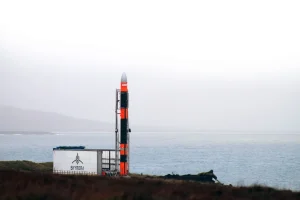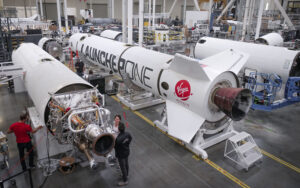UKSA £3 Million Atlantic Constellation Commitment
24th Nov 2023
The Atlantic Constellation, which is being spearheaded by Spain and Portugal, may soon welcome a new member: the UK. During the UK Space Conference in Belfast, the UK Space Agency (UKSA) pledged to bolster British Earth Observation capabilities. That commitment being: to join the Atlantic Constellation via a UK-built Pathfinder satellite.
UKSA said in a statement: “[the Atlantic Constellation] complement[s] the UK’s contributions to the EU Copernicus programme, European Space Agency and bilateral missions.” To fund the development of the British satellite, UKSA has committed £3 million, with contributions from Oxford-based Open Cosmos.
The Pathfinder Satellite & Atlantic Constellation
UKSA said they will be contributing a British developed Pathfinder satellite that will underpin the Atlantic Constellation. The satellite is also poised to be the first launched and the foundations of the constellation.
The Atlantic Constellation will offer global access to a string of small satellites that will monitor “ocean, Earth, and climate”. The UK’s Pathfinder contribution will be built in the UK and launched alongside three Portuguese satellites. However, to promote consistency, Pathfinder will be designed to the same specifications as the Portuguese satellites. Once complete, they will make up “the first batch of the constellation.”
The new Science, Innovation and Technology Minister, Andrew Griffith, who succeeded George Freeman after a recent government reshuffle, said: “Earth observation will play an absolutely vital role in tackling global challenges like climate change and disaster relief, providing the data we need at speed, while supporting key UK industries like agriculture and energy.”
“By working with Open Cosmos on a new satellite and supporting our Atlantic partners, Spain and Portugal, we can harness space tech for our shared goals, while creating new skills, opportunities and jobs for the future to grow the UK economy.”
What The Group Are Aiming To Achieve
Through the constellation, UKSA said “valuable and regularly updated data, and supporting critical services such as the detection, monitoring and mitigation of natural disasters,” will be readily available. UKSA also said Pathfinder will truncate the amount of time it takes to revist a particular orbital area by 33%. As a result, “more observations can be made of the same point on Earth,” UKSA added.
Data access is still under stipulation between the constellation’s leaders. However, initially, UK users will have the ability to secure ‘high-frequency data’ over a condensed satellite to location time-span. Ultimately, this will enable global data to be collected faster in order to effectively address “disaster relief action… climate change indicators, increasing agricultural productivity and improving energy use.”
The UK Space Conference: £4 Million Towards 23 Projects
In addition to announcing the Atlantic Constellation commitment, UKSA confirmed £4 million will go towards 23 emerging projects. Details of these projects are yet to be confirmed, but the funding will be sourced from the Enabling Technologies Programme. The goal is to expedite technology production that can address “global problems and benefit the work of space organisations internationally.” By doing so, UKSA said academics and industry experts can identify ways to use space for better weather prediction and climate change monitoring. They will also examine space debris deorbiting – which the UK has previously funded £3.9 million towards – and amplifying in-space imaging and servicing.
R2T2: Funding Future Space Orientated Graduates
The conference focused on the theme of ‘Space for Our Future’. To that end, UKSA announced that £4.9 million will go towards creating a Rocketry Research, Training and Teaching (R2T2) hub. Also, 30 PhD graduates will have the opportunity to enter a phased scheme to support the “growing UK satellite launch market”, which is currently experiencing a skills shortage. Over three stages, cohorts of 10 will enter the programme, and will work with a consortium of UK universities. UKSA concluded that by partnering graduates with the university syndicate, it will enable “the sharing of expertise and resources”.







Thank you for your comment! It will be visible on the site after moderation.